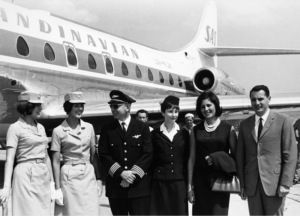News
Business News in Brief: Denmark unlikely to adopt Sweden’s air travel tax
This article is more than 7 years old.
In other news, it’s blue skies ahead for Aquaporin, Scandlines and Novo Nordisk

The Swedish airlines are still smiling, the passengers less so (photo: SAS Scandinavian Airlines)
Sweden’s new tax on air travel has raised fears a similar initiative might be introduced in Denmark.
If the same exact taxation were introduced, Danish passengers would be required to pay an extra 43.50, 181 or 290 kroner a flight – depending on the distance covered.
Passed on to passenger
Introduced in Sweden on April 1 in recognition of the high level of airline emissions, it passes on the cost to the passenger.
SAS, and other operators, meanwhile pay no tax on aviation fuel.
Hurting the poor
Simon Emil Ammitzbøll-Bille, the Danish minister for the economy and home affairs, condemned the tax on Twitter.
“This way, the global elite can carry on flying with a good conscience, while low-income people can travel less or stay home,” he declared.
Scandlines’ new owner keen to expand
Expansion is on the cards for Scandlines, a ferry company that operates two busy routes between Denmark and Germany, as it now has a new owner. First State Investments and Hermes Investment Management have together acquired 65 percent, with the former taking a 50.1 percent stake from previous owner, the 3i Group. Scandlines, which was founded in 1998 and has eight ferries, mainly operates on the Rødby-Puttgarten and Gedser-Rostock routes from southern Denmark to northern Germany. It also still runs a service between Helsingør and Helsingborg in southern Sweden.
Worth the wait for espresso we can all enjoy
Twelve years after its foundation, Aquaporin has finally released its first product, and it is generating excitement. Using its own patented filter, the Aquaporin machine takes impure water and makes it safe to drink. The Lyngby-based company, along with its Chinese manufacturer partner, is hopeful that the gadget resembling an espresso machine can service the needs of the estimated 2 billion people worldwide who do not have access to clean drinking water.
Novo’s new super drug could be a pill by 2020
Ozempic, the new diabetes drug that looks set to generate untold riches for pharma giant Novo Nordisk, could come out as a pill as early as 2020. Currently a weekly injection, it won approval from the US drug authorities in December. It works by ensuring that insulin is only secreted from the pancreas when the blood sugar level is high. It also helps with weight issues.
Danske Bank cuts crypto currencies
Danske Bank has ceased trading ETNs – the so-called Exchange Traded Notes linked to digital currencies such as Bitcoin. This means its customers will no longer be able to purchase securities linked to the price of the crypto currencies.










































